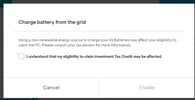sunwarriors
Member
I debated whether to even respond to this post or not, but since you quoted me and questioned my ethics I will.
There are no terms agreed to that state you cannot grid charge. There is no law that says you cannot grid charge. There is no IRS publication that says you cannot grid charge.
If you feel uncomfortable grid charging, then by all means feel free to refrain from doing so.
But there is absolutely nothing that states or even implies a lack of ethical or moral standards when it comes to this.
There is no law that you can't grid charge, but I think/am pretty sure there is law that IF YOU TOOK THE ITC tax credit for the batteries, you are required to charge only via solar for 5 years, not via grid.
That's the only thing. The IOUs probably can see if someone is exporting all during high peaks, grid charging at 12am, etc and if they wanted to go after this, homeowners doing this may have little recourse.
It's more of a tax issue vs. what's legal (don't need to add stuff like murder/etc). As for whether the IRS/IOU will check it, who knows. But if I was a person (or IRS) who wanted free $$, this may be easy pickings since that's the guidance pre IRA for most solar/ess systems.
After the IRA passed though, it's not clear for folks who order batteries now if they only had solar (I don't know the fine print there).
Sorta like how it was murky waters under NEM1.0/2.0 early on and how long grandfathering was if one updated their system (it's now not gray and it's the original PTO date from the docs I've seen posted here), this is and has been a grey area for me, but I don't think folks grid charging non-stop off-peak are scott free.
People will just do whatever they please so do whatever you want too, but I don't think it's tax legit until clear guidance comes out.






